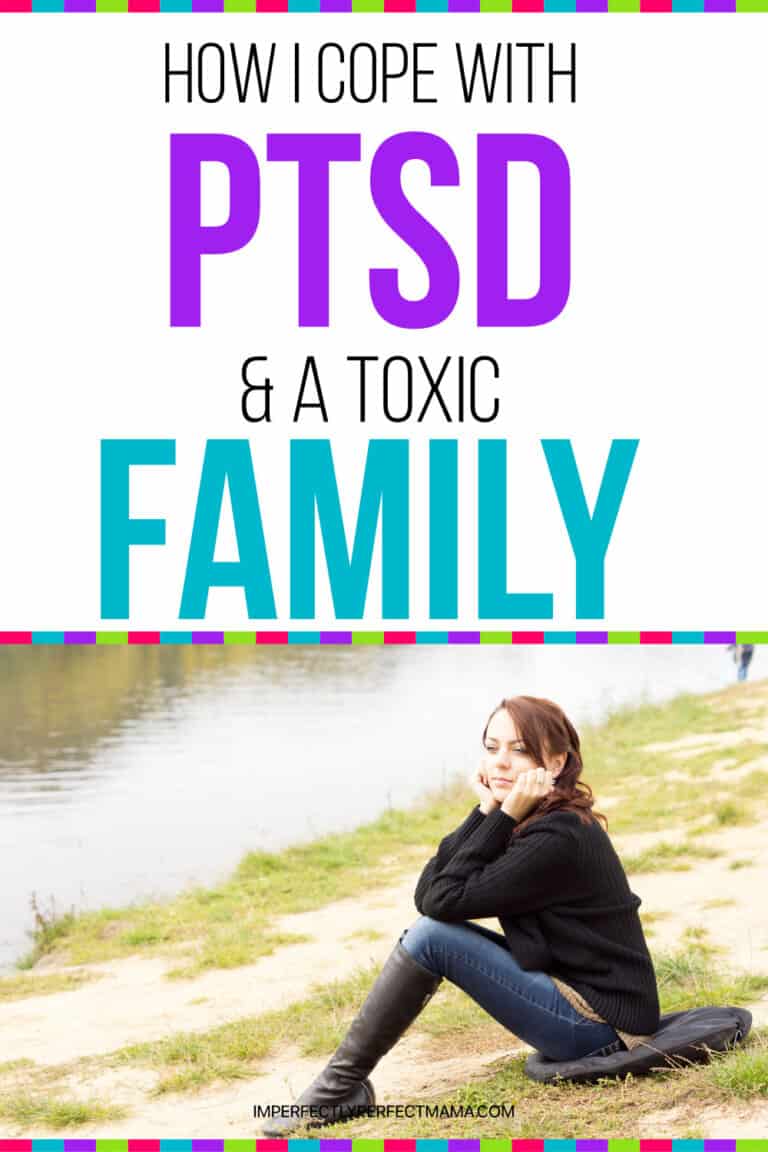Coping with PTSD and toxic family members can be a struggle, as you navigate the waters of setting boundaries and deciding how much contact to have.

This can be further complicated when you have older children that still want to have contact with family members that you no longer do.
This has been a struggle that I have been navigating for the last five years with my own family.
If you are going through something similar, please know that you are not alone.
I hope my story can help you realize there is hope.
How I Realized I was Raised by a Narcissist
Around the time that I was pregnant with my five year old, I was on a parenting message board complaining about how my mother was pushing me to have a baby shower that I didn’t need.
I had agreed to please her, and things were getting out of hand. One of the commenters on my posting directed me to another message board called Raised by Narcissists.
As I read through the pages of postings there, I realized just how toxic my relationship with my mother actually was. That is when I realized that I too, was raised by a narcissist.
Throughout the next year, I began to set boundaries with my mom, much to no avail.
Finally, I had to break off contact with her altogether, which is one of the hardest decisions I had to make.
Breaking contact came after finding out that my mom had done some things with my older daughter I had asked her not to, blatantly ignoring my wishes as a mother and endangering my child.
It had happened years ago, but my mom and sister had both not only repeatedly endangered my daughter, they also lied to me about it for ten years. I only found out from my daughter as a part of a casual conversation.
Sure, my daughter was already a teen, and not really in danger from my mother anymore.
But I had a new baby to consider too, and I wanted to keep her safe. Not to mention, I felt extremely triggered every time I saw my mother.
Making the decision to break contact was extremely difficult, and I still sometimes second-guess myself, even though my therapist tells me that it is better for me not to have contact.
Being the adult child of a narcissist, I have PTSD from childhood abuse and neglect from my parents, as well as other events.
This means I am easily triggered by insults, manipulation, and being spoken to negatively.
When I am around difficult people, that is worse.
Navigating Difficult Family Relationships

Now that I haven’t talked to my mom for a while, I am getting the time and space to heal.
My healing has included intensive talk therapy and EMDR (Eye Movement Desensitization and Reprocessing) therapy, medication and mindset coaching.
All of these combined have gotten me into a much better place emotionally these days.
Unfortunately though, when I think about seeing my mom, I still start to have panic attacks.
Some scars are difficult to heal, and I don’t know if I will ever feel ‘better enough’ to have contact again.
On a day to day basis, I don’t usually think about my mom or my trauma regularly anymore.
However, my 19 year old daughter still talks to my mom, and this presents a problem.
When my daughter graduated from High School over the summer, she let me know that she was inviting my mom to be one of her guests for the graduation ceremony. Immediately, I felt the panic start to well up in my chest.
My daughter let me know that her dad was going to be tasked with keeping my mom sitting far away from me. I think she meant it to be reassuring, but I don’t really trust her dad either due to our past, and I still felt pretty anxious about the graduation ceremony.
Due to my PTSD and my issues with my mom, I wasn’t able to fully enjoy my daughter’s graduation ceremony, which should have been a happy and joyous time for me.
I was so proud of her graduating, but instead of her graduation being about her, in my head it all became about trauma and panic for me.
After the graduation, I talked to my therapist about my reaction.
I asked him again if it was normal for me to be so panicked thinking about the possibility of seeing my mom. (I didn’t, thankfully.)
He said yes, due to the amount of trauma there, it was understandable. He suggested I talk to my daughter and set some boundaries with her in regard to my family.
Since my daughter is an adult now, I can’t tell her who to see, or who not to see.
But I can set boundaries with her about what events I am comfortable attending, and what I who I am comfortable talking about.
Setting Boundaries

When my daughter was getting ready to have her graduation party, I decided to have a serious talk with her, and let her know that I didn’t feel comfortable with going.
I was pretty nervous that it was going to be a difficult conversation.
I felt like a horrible mother for even thinking about telling her that I wasn’t going to go to the party.
But at the same time I knew that I needed to set boundaries, stand up for myself, and stay away from people who are overly triggering to me.
Actually having the conversation ended up being easier than I thought that it would be.
I told my daughter that she is an adult now, and she is welcome to talk to whoever she wants to, but I need to set a boundary about having her talk to me about those people.
I asked her not to talk to me about my mom anymore, or the rest of my mom’s side of the family. She is welcome to see who she wants, but I don’t need to hear about it.
When I tearfully told her this, she accepted my decision and gave me a hug.
Relationships can be difficult for those of us with PTSD from childhood trauma, and we expect to always be rejected.
However, when we have healthy, normal relationships we are unlikely to actually be rejected as often as we think.
The relationship I have with my own daughter is much healthier than the relationship that I had with my mother growing up.
Navigating my relationship with my adult daughter, even knowing that she still talks to the rest of my toxic family, has become easier now that she isn’t talking to me about the rest of the family anymore.
Conclusion
The decision to stop talking to any of your family members is difficult, and one that is typically not accepted well in society.
Unfortunately, this can still be the case even when after explaining how difficult and damaging your childhood was because of those people.
I feel lucky and blessed that I have a more open, honest and loving relationship with my own daughter than I ever had with my parents.
Sometimes it still amazes me that I have set boundaries with her, that she respects those boundaries, and still wants to have a relationship with me anyway.
Learning to set boundaries is very difficult for those of us who were raised with narcissists, because we don’t have the normal expectation that our boundaries will be respected.
Other people do this all the time and never question it, but trauma survivors constantly question the validity of our own needs.
However, learning to set boundaries is still worthwhile, and the right people in your life will respect them.
In normal relationships, boundaries aren’t a make or break.
They allow us to have better relationships with people, based on mutual caring and respect.




2 Comments